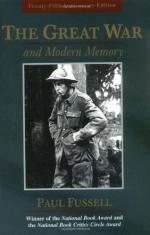
|
| Name: _________________________ | Period: ___________________ |
This test consists of 5 short answer questions, 10 short essay questions, and 1 (of 3) essay topics.
Short Answer Questions
1. What colors came to symbolize injury and hospitalization?
2. What are some different types of trenches called?
3. Siegfried Sassoon's last volume deals with what American history time span?
4. When was the final volume of the trilogy written?
5. When soldiers wrote letters home, they were not always _____.
Short Essay Questions
1. Fussell uses a variety of works by Sigfried Sassoon that he discusses in the book. What is the title of the first volume of Sassoon's trilogy, and what is the first volume about?
2. What has happened to the area by the Somme River where a fierce battle in the war took place?
3. What was the British's army biggest problem?
4. How does Robert Nichols's poem "Battery Moving Up to a New Position from Rest Camp: Dawn" show the symbolism of the Crucified Canadian?
5. Compare German trenches to British trenches.
6. What happened to the trenches when the wars ended?
7. How is the literature presented to illustrate the dichotomy between the officers and the soldiers?
8. What three things happened in November 1918 when the Allies broke through the German lines with their counterattack?
9. What is the myth of the ruined basilica with a statue of the Virgin and Child on top in Albert, France?
10. Fussell shows an example of a soldier from a book by Stuart Cloete. In Cloete's book, How Young They Died, how does the soldier view time?
Essay Topics
Write an essay for ONE of the following topics:
Essay Topic 1
Throughout Fussel's writings, he shows the harshness of war. What are some of the factors that makes war harsh? Do the harsh factors affect just the military, or does it affect civilians as well? Be specific and give examples from the writing.
Essay Topic 2
Fussell writes about the dichotomy between soldiers and officers in the military. Does this dichotomy cause tension between the officers and soldiers? List any works and authors who speak of this dichotomy and what they say about the dichotomy.
Essay Topic 3
Analyze what is meant by people feeling they have a duty toward the war. Why should people have this feeling? Is this a patriotic duty to always have or should we only have this feeling at wartime? In your writing, talk about Wilfred Owen's and Thomas Pynchon's writings, specifically, Gravity's Rainbow.
|
This section contains 832 words (approx. 3 pages at 300 words per page) |

|




